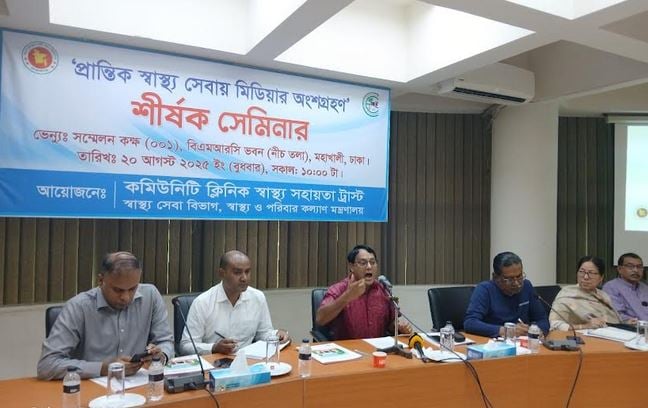News Flash

DHAKA, August 20, 2025 (BSS) - The government has taken an initiative to construct or relocate over 500 new community clinics in an effort to bring healthcare services to the doorstep of the rural population.
Community Clinic Health Support Trust Managing Director Md. Akhtaruzzaman revealed it at a seminar titled "The Role of Media in Ensuring Primary Healthcare for Marginalized Communities through Community Clinics" held today at the BMRC conference room in the capital's Mohakhali.
Mentioning that a nationwide plan has been initiated to expand the number of community clinics, he said in the first phase, construction will begin for 516 new clinics, with a list currently being compiled to pull ahead the process and the project will be financed by the Japan International Cooperation Agency (JICA).
Akhtaruzzaman said that the community clinic initiative stands as one of the most significant healthcare reforms in Bangladesh over the past 53 years. These clinics extend services beyond the union level, reaching even ward-level populations, as approximately 70 percent of the country's citizens receive primary healthcare through this network, he said.
He mentioned that each clinic supplies medicines for 22 common ailments, such as fever, cold, cough, digestive issues, and skin conditions. Moreover, the integration of a referral system to appropriate hospitals has introduced a new layer of efficiency and accessibility to the nation's healthcare services, he added.
Asif Mahmud, Director of Field Administration at the Trust, said that efforts are underway to reconstruct and renovate vulnerable community clinics across the country. The Trust aims to move beyond basic service delivery and focus on building a resilient healthcare infrastructure, he said, adding that plans include establishing a training institute that meets international standards.
Additionally, a digital referral system will be implemented to allow seamless tracking of patients' treatment history, ensuring timely and appropriate care, he said.
Asif Mahmud further mentioned that one of their long-term goals is to increase the number of female healthcare workers. Although currently 54 percent of Community Health Care Providers (CHCPs) are women, the aim is to gradually raise this to 80 percent or more.
Female CHCPs will also receive specialized training in midwifery to help achieving the SDG targets related to maternal and child health, he added.
The event also revealed that, on an average, 35 patients receive services from each community clinic daily. Across the country, approximately 490,000 people are served daily through these clinics, bringing the annual service recipient count to nearly 160 million.
At present, a total of 14,467 community clinics are in operation across the country. Each clinic is staffed by one Community Health Care Provider (CHCP), while Health Assistants and Family Planning Assistants offer services two days a week. The management of each clinic is overseen by a Community Group consisting of 13 to 17 members. Currently, there are 13,923 CHCPs serving nationwide.